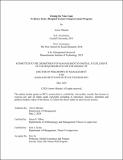Closing the Voice Gap: Evidence from a Hospital System’s Empowerment Program
Author(s)
Minster, Arrow
DownloadThesis PDF (1.323Mb)
Advisor
Silbey, Susan S.
Kelly, Erin L.
Terms of use
Metadata
Show full item recordAbstract
This dissertation explores how empowerment programs within organizations can effectively close workers’ voice gap, or the difference between workers’ desired and actual influence over organizational decision-making. By drawing on a 17-month ethnographic study of a hospital system’s empowerment program, I examined the interactional and cultural processes that guide the justification, sustainability, and efficacy of worker empowerment. Chapter 1 motivates and introduces the case of the hospital system’s empowerment program. Chapter 2 focuses on Coastal Care’s justifications for empowerment, specifically how leaders and managers described the program as valuable and appropriate for their organization. Chapter 3 explores how Coastal Care navigated and overcame the challenges that hindered continuous worker involvement in the program. I identified the importance of scaffolding, or various unscripted practices, which complemented the formal design of the empowerment program. The scaffolding provided informal opportunities for worker involvement in instances when the formal programming failed to do so, ultimately sustaining involvement in the program. Chapter 4 identifies a process and conditions necessary for closing the voice gap via the empowerment program. Although the program legitimated worker power over workplace change, effective empowerment relied on frontline managers actively crafting opportunities for workers to exercise influence. When managers made three moves (prioritizing workers' issues, centering diagnostic dialogues, and engaging with assigning tasks), they mobilized skeptical workers to address departmental processes. Managers variously deployed these strategies as a consequence of their history with the issue: when they were physically close to the issue and when they had not encountered previous failures in resolving it. This dissertation contributes to research on empowerment programs and organizational theories of worker voice and upward influence. I bridge these oft-siloed perspectives by identifying formal and informal practices that promote opportunities for worker influence over organizational decision-making.
Date issued
2024-05Department
Sloan School of ManagementPublisher
Massachusetts Institute of Technology